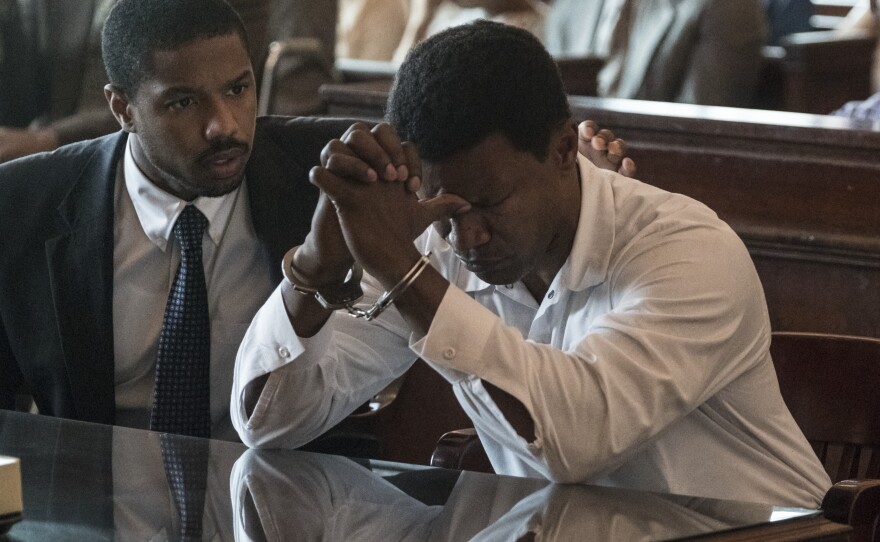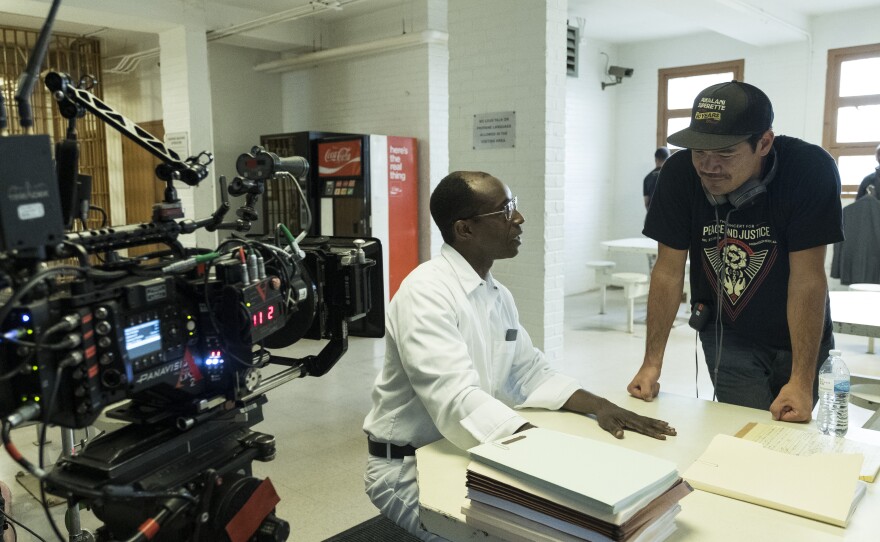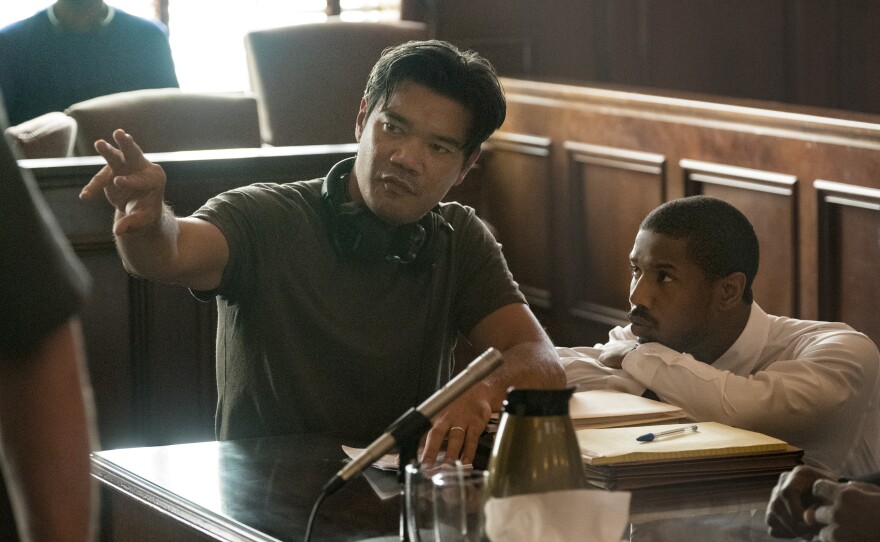Companion viewing
"The Thin Blue Line" (1988)
"After Innocence" (2005)
"Short Term 12" (2013)
"Clemency" (2019)
Filmmaker Destin Cretton went to San Diego State University and was recently tapped to direct the upcoming Marvel film “Shang-Chi and the Legend of the Ten Rings.” Currently his film “Just Mercy” is in theaters.
SDSU grad
I've had the pleasure of watching Destin Daniel Cretton grow and mature as a filmmaker since I was able to show all of his early student films at my Film School Confidential Showcase of Student Films. When “Short Term 12” came out in 2013 he credited attending Film School Confidential with leading him into filmmaking.
“That was the first time I went to a festival that had short films and Greg Durbin (a professor at SDSU) showed one of his shorts and he went up and did a Q&A afterward. And Greg was kind of the first filmmaker Lowell Frank and I reached out to when we were doing our first shorts in San Diego,” Cretton recalled. “So he was our introduction to the San Diego scene there.”
Cretton did his undergraduate work at Point Loma Nazarene University and then did his masters in television and film at SDSU. In watching his shorts and now features, I noticed how community always seems to play a role.
“I'm not sure if it's a conscious decision or not,” Cretton said. “I mean community has always been an important theme in my life. It’s part of the growing up experience in Hawaii. I think community is kind of everything there, community and family it's just part of the culture to call your friends' parents by aunty and uncle and that's the vibe of growing up on the island, that we’re kind of all in this together so we might as well make the best of it.”

'Just Mercy'
That sense of community permeates his current film, “Just Mercy.” The film is based on the non-fiction book about New York lawyer Bryan Stevenson who went to Alabama to establish the Equal Justice Initiative, a human rights organization dedicated to helping the poor, the incarcerated and the condemned. The film focuses primarily on Stevenson’s fight to free wrongfully convicted murderer Walter McMillian. Michael B. Jordan plays Stevenson and Jamie Foxx is McMillian — and both turn in stellar, deeply compelling performances.
But that is something Cretton has always been good at — getting real, natural performances from his cast whether it was in his short films or his features. He also has a great eye for talent having cast Brie Larson (“Captain Marvel”), Rami Malek (“Bohemian Rhapsody”), LaKeith Stanfield (“Sorry to Bother You,” “Get Out”), and Kaitlyn Dever (“Booksmart”) a couple years before they were on Hollywood’s radar.
Cretton immediately responded to Stevenson’s book when he read it and connected with the material.
“I feel like I'm constantly re-learning the lesson of, ‘Don't judge a book by its cover’ over and over and over in my life,” Cretton said. “And when I read Bryan Stevenson's book ‘Just Mercy,’ that's really what he does so brilliantly throughout the book. He starts with a character that is very easy to judge and then he starts peeling off the layers of that person introducing you to how they grew up, what their family life was like, were they abused as a child, did they go to war or what. And by the end of each chapter, you now have a completely different perspective on the character and that’s really what he not only does in his book that’s what he does in his work. That’s how he gets people off of death row who are wrongfully accused. He tells these stories and paints these pictures to judges and juries in order for them to have a really full perspective of who that person is and the judgment of them really does shift.”
That’s what Cretton does in the film as well. He introduces us to characters that we may think we know and then shows us their humanity. Even the white inmate who lied at McMillian’s trial gets to have shadings that you did not expect him to have.
I saw “Just Mercy” right after I watched Clint Eastwood’s “Richard Jewell,” which is also based on a real-life case. Jewell was the security guard who discovered the bomb at the 1996 Olympics and then became the FBI’s chief suspect in the case. No one deserves to go through what Jewell went through, but as he said in a press conference, he had “88 days of hell” and then he was cleared. McMillian spent decades in prison and even after evidence proved he was innocent he was still not freed or even given a new trial.
The difference between the films is in tone. Eastwood vilifies the media and the FBI and his film ends up using Jewell to make a point rather than trying to create a multidimensional character. Eastwood’s film offers no enlightenment or insight and no one comes across as real, they are just archetypes.
Cretton’s “Just Mercy,” by contrast, tries to examine the social context of what happened to McMillian and to explore how one needs to try and address that. He doesn’t vilify anyone although there are plenty of people who outrage us but no one is a caricature or flat stereotype. Cretton always tries to provide insight into why people behave the way they do.
Cretton credits the film’s tone of keeping it real to Stevenson. There are no larger than life Hollywood heroics but rather the working day, unglamorous heroics of a man who dedicates his life to fighting for people who don’t have a voice.
“There were certain things that he was rightfully so very protective of and one of those was really trying to show how one how easy it is for in this judicial system that we have how easy it is to lock up somebody, particularly people who are poor and don't have the legal resources that other people have, how easy it is to lock somebody up and condemn them to die in prison and how long and difficult it is to navigate the system in order to get that person out even when all of the evidence points to their innocence,” Cretton said.

In depicting Stevenson’s story, the film gives us a perspective that is less often seen.
“There really is a pretty intense feeling of helplessness with the African-American community and the issue of mass incarceration and what I found really emotionally moving through the book and through telling the story was seeing how when one family member is locked up how it affects the entire family and the community from which that person came from,” Cretton stated. “In particular when someone is locked up or accused of a crime like this when it was very clear that that person, Walter McMillian, was in the company of 30 members of his family and his community at the time of this murder. And when a judge and jury that are primarily Caucasian look at Walter McMillian and look at that community and say, ‘No, you guys are all wrong. He was on the other side of town doing this murder and whatever you all say it does not matter.’ The stripping of truth from a community was something that was really eye-opening to me and the frustration that comes along with it is a real psychological battle that not only is happening to the person who is in prison but all of his loved ones who are left out outside. The way that Walter McMillian's daughter puts it, she says her dad isn't the only one on death row. They put us all on death row when they locked him up.”
Directing a Marvel superhero film
Going from a socially concerned drama like “Just Mercy” or his earlier “Short Term 12” to the Marvel movie "Shang-Chi and the Legend of the Ten Rings" seems like a big leap.
“It is a big leap, I will say that,” Cretton said with a laugh. “But the process is extremely different and the same in that same breath. I mean, I think that the thing we all love about Marvel movies is they do look at and concentrate on characters who feel like humans and feel real and joke like we joke and cry like we cry and that's the thing that feels like a constant between the two.”
Based on his other films, I am looking forward to seeing what Cretton brings to Marvel. In the meantime, you can find a richly rewarding and deeply human film in “Just Mercy.”







